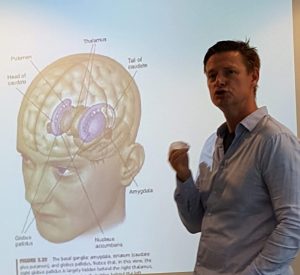In the near future, the vast majority of people will train to improve their mental health and wellbeing. Not only for chiseled abs, big biceps, and a body to show off on the beach. The well-known TV-doctor and psychiatrist Anders Hansen has taken Norway by storm. Training benefits the body, and especially the heart. Even shorter sessions produce results. Recently, comprehensive research reports have shown that people that battle with depression benefit more from training compared to antidepressants. Anders Hansen has become an easy to understand story teller that discuss depressions and other disorders. His message his both obvious and important. He was recently voted by viewers as someone they would most liked to invite home for dinner.

Anders Hansen is on the same page as many doctors that we work closely alongside, dedicated to understanding the relationship between depression and training. “It’s a hard battle to conquer, those who want to begin training often. Many people have the perception that training encompasses things such as cross-fit, difficult spin sessions, and heavy weights. The fact is that a small dose of training has a substantial impact. Newly conducted research by Harvard University at Massachusetts General Hospital linked physical activity with the reduced risk of depression. This was even with those who had the genetic predisposition to become depressed. The study sourced data from over 8000 people,” Anders Hansen tells us.
Lower Risk
The research could see that those who trained had a much lower risk of battling depression, unrelated to genetics. One of the main authors behind the report, Professor Karmel Choi, describes how “the narrative the genetics plays as big as a role as it has believed, is outdated.” Training can neutralize the risk considerably. It is clear that the harder one trains, the better. Nevertheless, low threshold training such as yoga and other exercises result in positive effects. Even 35 minutes a day can produce big differences.”
“In Sweden, every ninth person uses antidepressants. In Sweden, physical activity is often written out as a prescription, even though medicine is even more common. Nevertheless, the research shows the training has very similar benefits. Of course, medicine is important with deeper bouts of depression, but training on the side is found to decrease the recovery time substantially. For milder forms of depression common symptoms are loss of appetite, lower energy, worsening sleep patterns. Physical training releases endorphins that are also called, ‘the happiness hormone.’ It minimizes both stress and pain while increasing one’s mood,” Doctor Anders Hansen further explains. He is all of Sweden’s TV-doctor.
Increasing at record speed

Similarly, the number of reported cases of depression are increasing in Norway at a record pace. “There is an unfortunate little amount of focus on this ‘societal’ disease from our health professionals. Both under researched and lack of communication. Training is the key for both avoiding the darkness and as a stepping stone on your path to recovery. As we have said before, regular training regiments can not only delay the effects of dementia and Alzheimer’s, but you contribute to living a happier, healthier, and longer life every time you train,” Michael Ballke explains. He is both a general practitioner and one of the ambassadors for EviBase clinic. “When someone experiences heartache, it is the brain that is strained. This leads to an unbalance of neurotransmitters in the brain. Train it away,” Ballke says, who is both a salsa dancer and regularly works out …

